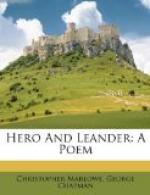|
This section contains 6,562 words (approx. 22 pages at 300 words per page) |

|
SOURCE: Brown, Georgia E. “Breaking the Canon: Marlowe's Challenge to the Literary Status Quo in Hero and Leander.” In Marlowe, History, and Sexuality: New Critical Essays on Christopher Marlowe, edited by Paul Whitfield White, pp. 59-75. New York: AMS Press, Inc., 1998.
In the following essay, Brown delineates the central thematic concerns of Hero and Leander and assesses its influence on the literary culture of the 1590s.
Why did Marlowe write Hero and Leander? Most critics have attempted to answer this question by approaching the poem as an essay on love. William Keach, for example, maintains that Marlowe's poem is about “the risks, limitations and disappointments of romantic love.”1 Marlowe's intentions are ultimately unrecoverable, but one way of approaching the question is to consider Marlowe's poem in its generic context. Hero and Leander is part of the epyllion craze that swept England in the 1590s, and Marlowe's choice of...
|
This section contains 6,562 words (approx. 22 pages at 300 words per page) |

|


